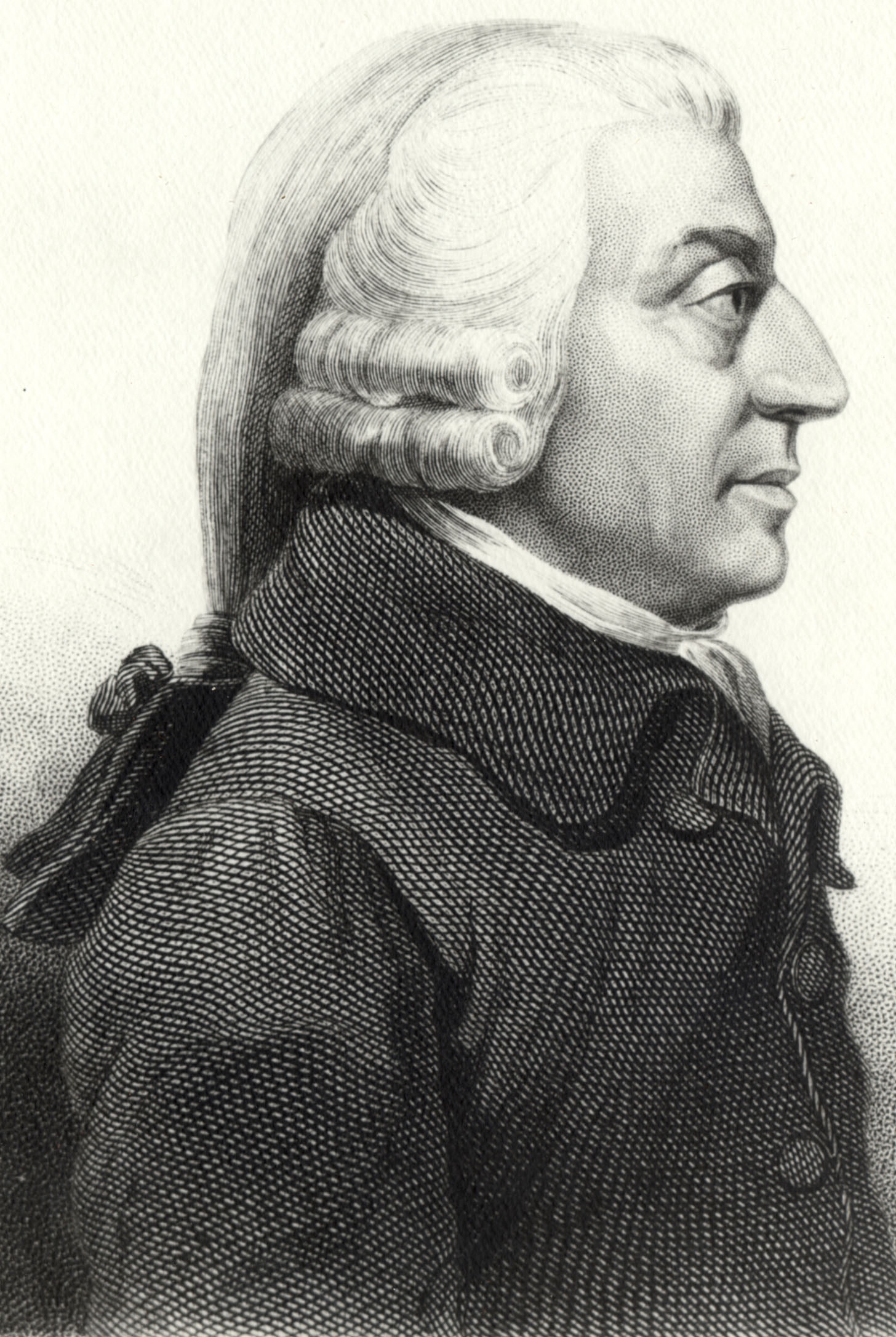“No fixed capital can yield any revenue but by means of a circulating capital.”
Source: (1776), Book II, Chapter I, p. 311.
Adam Smith was a Scottish economist, philosopher and author as well as a moral philosopher, a pioneer of political economy and a key figure during the Scottish Enlightenment era. Smith is best known for two classic works: The Theory of Moral Sentiments and An Inquiry into the Nature and Causes of the Wealth of Nations . The latter, usually abbreviated as The Wealth of Nations, is considered his magnum opus and the first modern work of economics.
Smith studied social philosophy at the University of Glasgow and at Balliol College, Oxford, where he was one of the first students to benefit from scholarships set up by fellow Scot, John Snell. After graduating, he delivered a successful series of public lectures at Edinburgh, leading him to collaborate with David Hume during the Scottish Enlightenment. Smith obtained a professorship at Glasgow teaching moral philosophy and during this time wrote and published The Theory of Moral Sentiments. In his later life, he took a tutoring position that allowed him to travel throughout Europe, where he met other intellectual leaders of his day.
Smith laid the foundations of classical free market economic theory. The Wealth of Nations was a precursor to the modern academic discipline of economics. In this and other works, he developed the concept of division of labour and expounded upon how rational self-interest and competition can lead to economic prosperity. Smith was controversial in his own day and his general approach and writing style were often satirised by Tory writers in the moralising tradition of William Hogarth and Jonathan Swift. In 2005, The Wealth of Nations was named among the 100 Best Scottish Books of all time. The minor planet 12838 Adamsmith was named in his memory.

“No fixed capital can yield any revenue but by means of a circulating capital.”
Source: (1776), Book II, Chapter I, p. 311.
Source: (1776), Book I, Chapter VIII, p. 81.
Chap. I.
The Theory of Moral Sentiments (1759), Part III
Source: (1776), Book V, Chapter II, Part II, p. 894.
“II. The tax which each individual is bound to pay ought to be certain, and not arbitrary.”
Source: (1776), Book V, Chapter II, Part II, p. 892.
“All registers which, it is acknowledged, ought to be kept secret, ought certainly never to exist.”
Source: (1776), Book V, Chapter II, Part II, Appendix to Articles I and II, p. 935.
Section II, Chap. I.
The Theory of Moral Sentiments (1759), Part VII
Source: (1776), Book I, Chapter VIII, p. 87.
Section I, Chap. V.
The Theory of Moral Sentiments (1759), Part I
Section I, Chap. III.
The Theory of Moral Sentiments (1759), Part I
Source: The Wealth of Nations (1776), Book IV, Chapter II
Chap. I.
The Theory of Moral Sentiments (1759), Part IV
Source: (1776), Book I, Chapter I
“the competition of the poor takes away from the reward of the rich.”
Source: (1776), Book I, Chapter X, Part II, p. 154.
Source: (1776), Book II, Chapter III, p. 381.
“All money is a matter of belief.”
https://www.amazon.com/All-money-matter-belief-quotes/dp/B01M0HLG6B
Attributed
Section II, Chap. II.
The Theory of Moral Sentiments (1759), Part II
“Corn is a necessary, silver is only a superfluity.”
Source: (1776), Book I, Chapter XI, Part III, (First Period) p. 223.
Source: (1776), Book V, Chapter III, Part V, p. 1032 (Last Page).
Chap. I.
The Theory of Moral Sentiments (1759), Part IV
Source: (1776), Book I, Chapter XI, Part III, (Conclusion..) p. 282.
Chap. III.
The Theory of Moral Sentiments (1759), Part III
Source: (1776), Book IV, Chapter III, Part II, p. 530.
Section II, Chap. I.
The Theory of Moral Sentiments (1759), Part II
Source: (1776), Book IV, Chapter V, p. 563.
Source: (1776), Book II, Chapter I, p. 305.
Source: (1776), Book IV, Chapter II
Source: (1776), Book IV, Chapter III, Part II, p. 534.
Source: (1776), Book IV, Chapter I, p. 471.
Source: (1776), Book IV, Chapter II
“Upstart greatness is everywhere less respected than ancient greatness.”
Source: (1776), Book V, Chapter I, Part II, p. 773.
Source: (1776), Book IV, Chapter II, paragraph 36, p. 500.
Source: The Wealth of Nations (1776), Book IV, Chapter I, p. 471.
Source: (1776), Book IV, Chapter VII, Part Third, p. 667.
Source: (1776), Book I, Chapter XI, Part III, Conclusion of the Chapter, p. 292.
Source: (1776), Book IV, Chapter V, p. 577.
Source: (1776), Book V, Chapter II, Part II, Article IV.
Source: (1776), Book V, Chapter II, Part II, Appendix to Articles I and II.
Source: (1776), Book V, Chapter I, Part II, p. 778.
Source: (1776), Book I, Chapter X, Part I, p. 136 (tendency of the rate of profit to fall).
Section III, Chap. I.
The Theory of Moral Sentiments (1759), Part II
Source: (1776), Book IV, Chapter I, p. 470.
“Secrets in manufactures are capable of being longer kept than secrets in trade.”
Source: (1776), Book I, Chapter VII, p. 72.
Source: (1776), Book V, Chapter II, Part II, Article IV, p. 951.